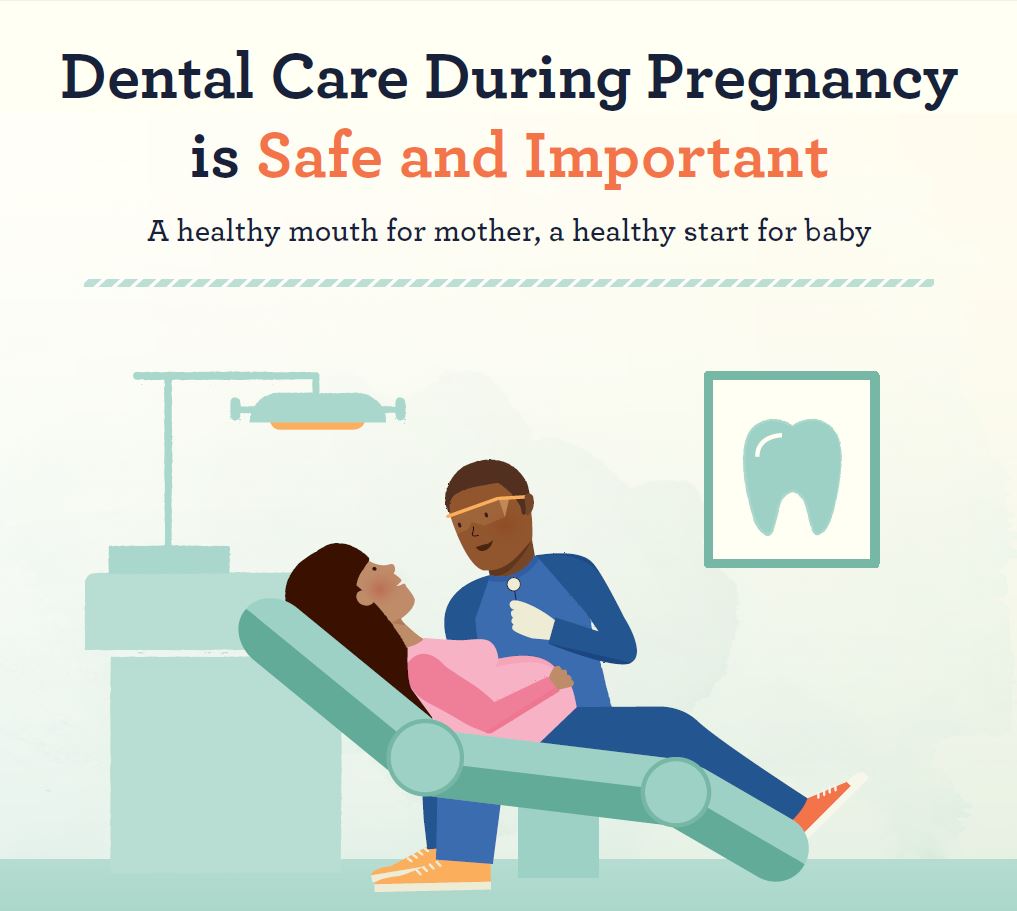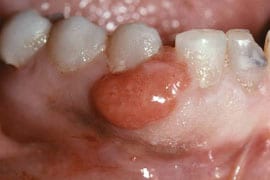Dental Care during Pregnancy
Is it safe to see the dentist while pregnant? Yes, it is! The American Dental Association and the American College of Obstetricians and Gynecologists agree that oral health care during pregnancy is safe and delaying treatment can be bad for you and your child. Dental care during pregnancy helps ensure a healthy mouth for mother, and a healthy start for baby!

Physiologic changes during pregnancy can cause oral health problems, including gum problems and dental erosion (Silk 2008). Untreated gum infections in pregnant women are associated with a higher incidence of premature births and underweight babies (Michalowicz 2008, Jeffcoat 2003, Lopez 2005. Dental care is not only safe but important to maintain oral health during pregnancy.
Gum Problems
Hormonal changes increase the risk of gum problems and infections during pregnancy. Pregnancy gingivitis is the most common pregnancy complication affecting 60-75% of all pregnant women, yet Steinberg showed that women tend to avoid going to the dentist while pregnant (Steinberg 2013)
Gingivitis is the acute inflammation of the gums. Signs of gingivitis can include swelling and bleeding. Some extra effort in caring for your teeth may help. Be sure to 1)Brush twice a day for 2 minutes with toothpaste, 2) Clean between your teeth once per day with dental floss or another interdental cleaner.
Left untreated, gingivitis can lead to periodontitis. With periodontitis, the infection goes beneath the gum resulting in bone loss. Without dental treatment, teeth can become loose and may even fall or need to be pulled.
Pregnancy Oral Tumor

Pregnancy Oral Tumors / Epulis of Pregnancy occur in up to 5% of pregnancies. These vascular lumps don’t usually hurt, but they can make it difficult to keep your teeth clean. Typically, they recede and resolve after the baby is born, but if they interfere with taking care of your teeth or eating, please make an appointment with us so that we can evaluate if removal would be best
Dental Erosion
Dental erosion is the loss of enamel, the hard outer layer of teeth. It can happen when your teeth are repeatedly exposed to acid. If you are committing frequently, you may be at risk for developing erosion.
To help prevent dental erosion, rinse your mouth after vomiting with a baking soda rinse (1 teaspoon of baking soda dissolved in 1 cup of warm water). And don’t brush right away! It’s best to wait at least 30 minutes before brushing. The baking soda rinse and time will allow your enamel to harden making it less susceptible being brushed away.
Dental Cavities
Pregnant women are at higher risk for cavities due to increased acidity in the mouth, sugar cravings, and limited attention to oral hygiene (US Dept of Health and Human Services Report 2017). Prevention is best so it’s recommended for women with moderate to high risk of caries to brush twice a day with fluoridated toothpaste and limit sugary foods. Untreated cavities can progress to oral abscesses and facial cellulitis.
Dental Treatment Considerations for Pregnant Women
Dental Radiographs: Xrays are considered to be safe throughout pregnancy by the American College of Obstetricians and the American Dental Association. We do not take radiographs on pregnant patients in the absence of acute issues, but isn’t it comforting to know that they are safe enough even for pregnant women and their unborn children.
Medications: If you may develop a cavity or gum infection that requires treatment during pregnancy, we have safe options available for local anesthetic, antibiotics, and pain relief should you need them.
Timing: Although treatment is safe throughout pregnancy, you may be more comfortable during the second trimester. Nausea and vomiting could be a problem during the first trimester, and during the third trimester, you may be uncomfortable when the chair is reclined. Tell us if you are uncomfortable or lightheaded during treatment so that we can find a better position during treatment.
Healthy Mouth for Mother, Healthy Start for Baby
What you eat during your pregnancy affects the development of your baby, including the teeth. Baby teeth begin forming during the sixth week of pregnancy and their mineral layers begin forming around 4 to 6 months of pregnancy (Hopkins Medicine). It’s even been found that prenatal exposure to gestational diabetes mellitus increases developmental defects in the enamel of offspring (Pascon 2019). While more research needs to be done, it’s axiomatic that a mother’s wellness is critical to baby health. Here are tips for taking good care of yourself to get your baby off to a healthy start!
Eat a healthy diet
What you eat during pregnancy affects the growth of your unborn child, including their teeth.
- Calcium & Phosphorus: Calcium, a mineral that is the main component of teeth. The best dietary sources of calcium are in dairy foods such as milk, cheese, and low-fat yogurt. The calcium your baby needs is provided by your diet, not your teeth. Be sure to get enough calcium in your diet. Phosphorus, another mineral that accounts for the hardness of teeth. This is found in many high protein sources such as meat and milk.
- Vitamin D: Vitamin D helps the body absorb and retain calcium and phosphorus. Very few foods contain Vitamin D naturally. Mostly oily fish such as salmon and tuna. It is also produced naturally in the body when exposed to direct sunlight, although extensive periods of direct sunlight is highly discouraged.
Snacking & Tooth Decay. During pregnancy, it is normal for woman to feel hungry and have the desire to eat more in between meals. However, frequent snacking on sugary foods causes acid to attack the teeth, this can be an invitation for tooth decay. When snacking, choose foods that are nutritious for you and your baby such as raw fruits and vegetables, yogurt, or cheese. Always make sure to follow your physician’s advice regarding diet.
Tips for Oral Wellness During Pregnancy:
- Brush twice a day for 2 minutes. If you are at elevated risk for decay, please use fluoridated toothpaste.
- Clean between your teeth once per day with dental floss or another interdental cleaner.
- Eat a variety of healthy foods such as fruits, vegetables, whole grain products and dairy products.
- Eat fewer foods that are high in sugar, including candy, cookies, cake or high sugar beverages such as juice and soft drinks.
- Choose foods low in sugar such as fruit, vegetables, cheese and yogurt for snacking.
- Meals are better than grazing throughout the day for your teeth.
- Drink water throughout the day, between meals and snacks.
- Reduce the risk of birth defects by taking 600 micrograms of folic acid each day throughout your pregnancy. Take a dietary supplement of folic acid and eat foods high in folates such as asparagus, broccoli, legumes, oranges, strawberries, bananas, and grain products fortified with folic acid.
Conclusion:
Congratulations on this exciting chapter! We are excited to be a member of your support team during this time of change and growth. Professional associations for dentists and obstetricians agree that dental treatment is safe, and optimizing oral health during pregnancy is crucial for mother and baby!
While an in-person exam is the most comprehensive, in light of the pandemic, we offer virtual visits. Please don’t let your fears of COVID-19, hinder you from getting needed care. If you have any questions, please contact us!
